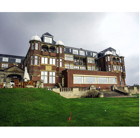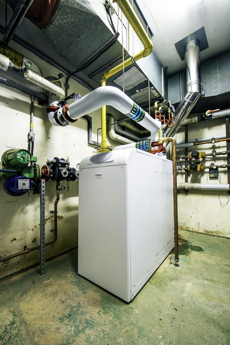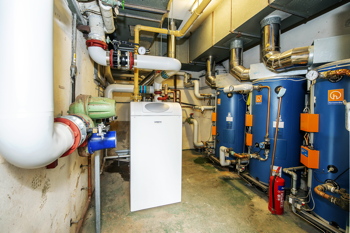Beside the seaside

The Victoria Hotel in Sidmouth, part of the Brend Hotel Group, promises its guests that: “From the moment you step through the original carriage portico, you will be surrounded by warmth and refinement.” Where the exquisite décor and four-star service provides the refinement, a new A-rated efficient boiler from Potterton Commercial is now providing the warmth.
With such a pledge to live up to, it is essential that visitors to the Victoria are kept warm and comfortable all year round. That’s why this year the hotel acted fast to replace its outdated and inefficient heating system with a new boiler.
Set in a landmark Victorian building, the hotel offers four-star accommodation overlooking Sidmouth’s seafront. Whilst its location offers guests a beautiful view, British seaside weather means that the hotel’s heating system must work harder in the colder months to keep its guests cosy. As it is a listed building, modern insulation measures such as double glazing are not an option, so energy efficiency gains need to be made elsewhere.
“Previously, three atmospheric boilers provided heating to the hotel’s 70 rooms, until one of them suddenly failed,” said Mark Gage, energy and environment manager at Brend Hotels. “The system had been in place for more than 20 years, so it made sense at that point to replace all three, and it gave us the opportunity to become more energy efficient by installing a modern condensing boiler.”
 |
|
A modulation ratio that is an excellent solution for hotels |
The hotel had some key requirements for its new heating system. It needed a boiler that could fit within the limited footprint of the existing plant room on the ground floor of the property. There also needed to be some form of back-up in case of a heating system failure.
Gage, who also manages heating systems in sister hotels across the Brend Group, enlisted the help of Marc Coombes at Sidmarc, who has worked with the hotel group for two decades, to find the perfect solution. In order to recommend the correctly-sized boiler to match the hotel’s space heating load, Coombes needed to survey the property.
“We conducted a thorough analysis of the building and based the heating requirements on factors such as the number of radiators present and an assessment of the pipework system,” says Coombes. “We concluded that the hotel needs 300kW of energy to operate effectively. With this in mind, the options were that we could have three smaller boilers, or go for the latest dual burner technology that could replace three existing boilers with one to save space, without compromising on performance, energy efficiency or redundancy.”
As a Potterton Commercial boiler was already providing heating for guests at another hotel in the group, Phil Smith, area sales manager was invited to quote for the job and discuss how its boilers can meet this hotel’s particular needs.
Coombes says: “We were pleased with the heating system at our other hotel, so we knew we could rely on Potterton Commercial. Initially, we discussed a cascade solution for the Victoria hotel which would involve several boilers being installed. But because this required a separate header, we decided to go for the less complex option of a dual-burner. With twin controls, we like that this is effectively two boilers in one, and if one burner should fail we can still provide the hotel with heating.”
Smith adds: “The Sirius FS 400kW was put forward as the perfect fit for Victoria Hotel. With a modulation ratio of 11.5:1, variable heating requirements can be met to optimise energy efficiency and running costs. That’s why it’s good for hotels with fluctuating occupancy rates and heating loads. With a weather sensor as standard, the boiler’s output can also vary according to outside conditions to further maximise energy efficiency. This technology gives a period building such as Victoria Hotel, which is limited on the kinds of energy efficiency measures it can implement, another way to lower its energy consumption and carbon footprint.”
The new system was installed in the summer of 2017, when heating wasn’t required, so that the guest experience wouldn’t be affected. As the Sirius unit is a condensing boiler whereas the previous boilers weren’t, a new flue was required. This was designed and located in such a way so that there was no need to relocate the Sirius boiler. However, Sidmarc did change some of the pipework so that better access can be gained to the unit, pumps, flue and pipework for ongoing maintenance or repairs in the future.
 |
|
The new boiler takes up less floorspace |
“The first thing I noticed was how incredibly quiet the new system was compared to our noisy old boilers,” Coombes says. “The whole process of installation was very straightforward, and the support provided by Potterton Commercial meant that we were up and running in just a few days.”
The hotel also appreciated the company’s help with overseeing the commissioning process and setting the boiler’s weather compensation curve, at no extra cost.
Coombes concludes: “We are really pleased with the new boiler so far. We’ve found that it is easy to maintain and provides a more efficient and reliable heating source than our previous system. We have been able to depend on Potterton Commercial and Sidmarc at every stage of the project, from design and tender, through to installation, commissioning, handover and beyond.”







